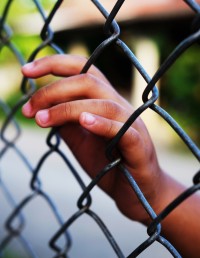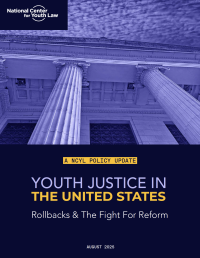Colorado Bill Aims to 'Raise the Floor' on Minimum Age for Arrest, Detainment
FOR IMMEDIATE RELEASE
January 24, 2022
Contact: [email protected]
DENVER — In an effort to acknowledge the unique mental health challenges for youth and bring Colorado into alignment with current understanding of cognitive capacity for young children, Colorado Rep. Serena Gonzales-Gutierrez (D-Denver) today introduced a bill that calls on state lawmakers to “Raise the Floor” on the minimum age of juvenile court jurisdiction for children who come in contact with law enforcement. This bill, which has bipartisan support, is co-sponsored by Representative Jennifer Bacon (D-Denver), Senator Julie Gonzales (D-Denver) and Senator Don Coram (R-Archuleta, Dolores, La Plata, Montezuma, Montrose, Ouray, San Juan, San Miguel).
House Bill 22-1131, “Concerning measures to reduce justice involvement for young children, and in connection therewith, focus on prevention and age-appropriate interventions”, also referred to as the “Raise the Floor” Act, would raise the current minimum age for juvenile court jurisdiction, thereby prohibiting arrest, prosecution, and detention of children age 12 and younger, except for homicide cases, protecting them from the negative impacts of formal justice system involvement and reducing future risk to community safety. The bill is backed by a Youth Justice Collaborative coalition, composed of child advocates, grassroots organizations, service providers and medical experts, based on research that shows developmentally-appropriate interventions — outside of the justice system — have been proven to promote positive youth development and improve public safety.
Making juvenile detention off-limits for 10- to 12-year-olds — the overwhelming majority of whom, when arrested, face charges for non-violent offenses — would also bolster the state’s coffers by cutting into wasteful spending. Rather than compounding underlying issues, community-based interventions outside the justice system are cheaper and far better at preventing future interactions with law enforcement. In contrast, incarceration has been shown to actually increase the likelihood that a child will be arrested again and frays ties to family and community, damaging the relationships that are the most reliable predictors of future success.
Rep. Gonzales-Gutierrez noted that the bill will provide crucial supports for children and families.
“In the last 10 years Colorado has taken the lead in efforts to provide services to our youth and families in the community and preventing children and youth from being removed from their home,” Rep. Gonzales-Gutierrez said.
She continued: “During my 18 years in the Child Welfare and Juvenile Justice field I have witnessed our systems become more educated in trauma and the importance of community-based mental and behavioral health services to prevent children and youth from becoming involved in the Juvenile Justice system. This policy aims to disrupt children and youth’s trajectory into the adult criminal justice system by keeping them from being charged and instead utilizing the services, resources, and systems in place to address underlying root issues.”
Senator Coram added:
“Colorado families deserve the dignity and respect of getting the support they want and need when facing difficulty with their kids. What we know is that arresting and prosecuting young children is not the kind of intervention that helps families recover from a crisis and, in fact, it makes our communities less safe when we push kids into a cycle of recidivism. It’s time Colorado align our juvenile justice procedures with the current science for youth mental health. Rather than traumatizing kids with expensive criminal interventions, our state can save money by treating kids in crisis where they can and should be treated- within families, in schools, and other systems designed for their care.”
Frankie Guzman, Senior Director of the Youth Justice Initiative at the National Center for Youth Law, said:
“During preadolescence, children are only beginning to develop a sense of self-identity and independence. It is a time of curiosity, exploration, testing boundaries, and learning from mistakes. Unfortunately, too often, children of color are not afforded meaningful opportunities to learn from their mistakes; instead, they are treated as criminals, processed in the legal system, and subjected to heavy-handed legal consequences that negatively affect them for the rest of their lives. HB 22-1131 would ensure that children 10-12 years olds that exhibit problematic behavior are treated appropriately for their level of development – recognizing their reduced culpability and tremendous capacity to learn and grow – and supported in becoming healthy adults.”
Data does not support locking up young children
A total of 659 children ages 10 to 12 were arrested, separated from their families, and held behind bars in Colorado from 2015 to 2019, according to state data. The data suggests most of these arrests were unnecessary, as only two of the cases were deemed serious enough to warrant the child being kept in custody beyond initial detention.
Law enforcement agencies in the state also arrest Black children at alarmingly high rates. Despite the fact that Black children make up only 7% of Colorado’s population of 10- to 12 year-olds, Black children accounted for nearly 40% of detentions.
A bevy of research has shown that secure lock-ups are particularly dangerous environments for young children. Among recent findings:
Younger children are at higher risk of becoming victims of sexual abuse in detention. More than 25% of incarcerated children 12 years of age and younger were victims of violence while confined. Even brief detainments can worsen mental health issues and disrupt educational outcomes. Incarceration frays ties to family and community, damaging relationships that are the most reliable predictors of future success. Secure confinement for young children increases their likelihood of getting arrested again.
A healthier, more effective approach
Community-based interventions would not only be healthier for children, but also for the state’s budget. Alternatives to justice-system involvement have proven more effective at much lower costs.
Children should be able to access this evidence-based programming through community- and school-based referrals without first having to endure a traumatizing arrest and expensive juvenile court processing.
For those children who do need additional resources, in addition to existing programs and placements through Colorado’s behavioral health and child welfare systems, 2022 will see an infusion of funds for mental health treatment for children, including establishing more state contracted beds for children with high needs; and the start of a crisis intervention team system to assist families.
Supporters
This bill is supported by organizations and individuals that advocate on behalf of children. These include the Healthier Colorado, Interfaith Alliance, Together Colorado National Center for Youth Law, Colorado Circles for Change, Colorado Juvenile Defender Center, ACLU of Colorado, COLOR, Disability Law Colorado, Rocky Mountain Children’s Law Center, Girls Inc., National Association of Counsel for Children, Court Appointed Special Advocates, Stand Up For Children Colorado, Law Enforcement Action Partnership (LEAP), Mirror Image Arts, Project Pave, Office of the Colorado State Public Defender, Office of the Alternate Defense Counsel, Colorado Attorneys Against Police Violence, and the University of Denver’s Forensic Institute for Research, Service and Training.






